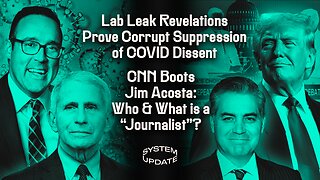Premium Only Content

On reparations: John F. Kennedy vs. Robert F. Kennedy | CLIP | Larry Elder
⭕️Watch the full episode👉 https://ept.ms/2TrFbCZ
⭕️Watch in-depth videos based on Truth & Tradition at Epoch TV👉 https://ept.ms/3j1W0gX
When did the civil rights movement go off the rails?
The answer is when proponents went from justly demanding equal rights to unjustly demanding equal results. As to exactly when this occurred, that’s more difficult to answer. But consider statements, made five years apart, from the Kennedy brothers, John F. and Robert F.
Neither brother was asked about nor used the word “reparations.” But during an August 1963 news conference, a reporter asked President John Kennedy about “special dispensation” for blacks: “Mr. President, some Negro leaders are saying that, like the Jews persecuted by the Nazis, the Negro is entitled to some kind of special dispensation for the pain of second-class citizenship over these many decades and generations. What is your view of that in general, and what is your view in particular on the specific point that they are recommending of job quotas by race?”
JFK replied, “I don’t think that is the generally held view, at least as I understand it, of the Negro community, that there is some compensation due for the lost years, particularly in the field of education.”
“What I think they would like is to see their children well educated so that they could hold jobs and have their children accepted and have themselves accepted as equal members of the community. So I don’t think we can undo the past. In fact, the past is going to be with us for a good many years in uneducated men and women who lost their chance for a decent education. We have to do the best we can now. That is what we are trying to do. I don’t think quotas are a good idea. I think it is a mistake to begin to assign quotas on the basis of religion or race or color, or nationality.”
Five years later, Sen. Robert Kennedy announced his candidacy for president. He said, “I run to seek new policies—policies to end the bloodshed in Vietnam and in our cities, policies to close the gaps that now exist between black and white.”
“Policies to close the gaps that now exist between black and white”? In 1940, 87 percent of blacks lived below the poverty level. By 1960, that number dropped to 47 percent—a 40-point drop in 20 years, the greatest 20 years of economic growth for black Americans in history. Brown v. Board of Education, which struck down “separate but equal,” was not decided until 1954. This sharp decline in black poverty preceded the Civil Rights Act of 1964.
John Kennedy was right. We cannot undo the past. But by teaching Black people to see themselves as victims deserving of “reparations” from today’s white “oppressors,” we can certainly make the present and future worse.
---
Sign up for our NEWSLETTER and stay in touch
☀️ https://ept.ms/EpochTVNewsletter
SUBSCRIBE to our unique new platform
☀️ https://www.epochtv.com
---
SUBSCRIBE OUR CHANNEL TODAY:
⭕️https://www.youtube.com/channel/UCr9eziCDBtDANyWguKLr4vg?Sub_confirmation=1
---
Support us to fight for the truth!
💛 https://donorbox.org/epochtv
---
Follow EpochTV on social media👇
Facebook: https://www.facebook.com/EpochTVus
Twitter: https://twitter.com/EpochTVus
Rumble: https://rumble.com/c/EpochTV
Gettr: https://gettr.com/user/epochtv
Gab: https://gab.com/EpochTV
Telegram: https://t.me/EpochTV
Parler: https://parler.com/profile/EpochTV
🔵 iTunes Podcast: https://ept.ms/EpochTVApplePodcasts
🔵 Spotify Podcast: https://ept.ms/EpochTVSpotifyPodcast
🔵 Google Podcast: https://ept.ms/AppleTVGooglePodcast
#JohnFKennedy #RobertFKennedy #LarryElder
------------------
© All Rights Reserved.
-
 1:24
1:24
EpochTV
2 days agoEXCLUSIVE: President Santiago Peña on What Trump’s Return Means for Paraguay and Latin America
2.24K -
 5:46
5:46
America First Policy Institute
13 hours agoSchool Choice Empowering Parents, Transforming Futures America First Policy Institute #schoolchoice
1.45K2 -
 1:00:40
1:00:40
PMG
15 hours agoNo Security for Fauci & Was It Known That the mRNA COVID Vaccines Would Cause Cancer?
1.62K5 -
 3:17:30
3:17:30
Price of Reason
13 hours agoTrump Makes Waves! Disney Captain America HATES America! Selena Gomez MELTDOWN! Ubisoft CRUMBLES!
31.7K4 -
![[Tekken Tuesday] Its Time! Buckle Up Butter Cup!](https://1a-1791.com/video/fwe2/36/s8/1/I/U/S/e/IUSex.0kob-small-Tekken-Tuesday-Its-Time-Buc.jpg) 8:16:12
8:16:12
CHiLi XDD
12 hours ago[Tekken Tuesday] Its Time! Buckle Up Butter Cup!
84.5K5 -
 3:05:19
3:05:19
PandaSub2000
17 hours agoDuckTales Remastered | ULTRA BEST AT GAMES (Original Live Version)
108K2 -
 7:57:42
7:57:42
SpartakusLIVE
12 hours agoShadow BANNED Day 1 of NEW Season || Has WZ been FIXED?!?!
69K -
 1:19:42
1:19:42
Glenn Greenwald
13 hours agoLab Leak Revelations Prove Corrupt Suppression of COVID Dissent; CNN Boots Jim Acosta: Who & What is a "Journalist"? | SYSTEM UPDATE #398
90.8K106 -
 1:11:00
1:11:00
Donald Trump Jr.
17 hours agoFirst White House Press Briefing, Plus Behind the Scenes on Capitol Hill w/ Rep Vince Fong & Sen Eric Schmitt | TRIGGERED Ep.211
208K208 -
 1:45:52
1:45:52
Redacted News
14 hours agoBOMBSHELL! Trump about to announce largest spending FREEZE in American history, deep state in PANIC
254K405